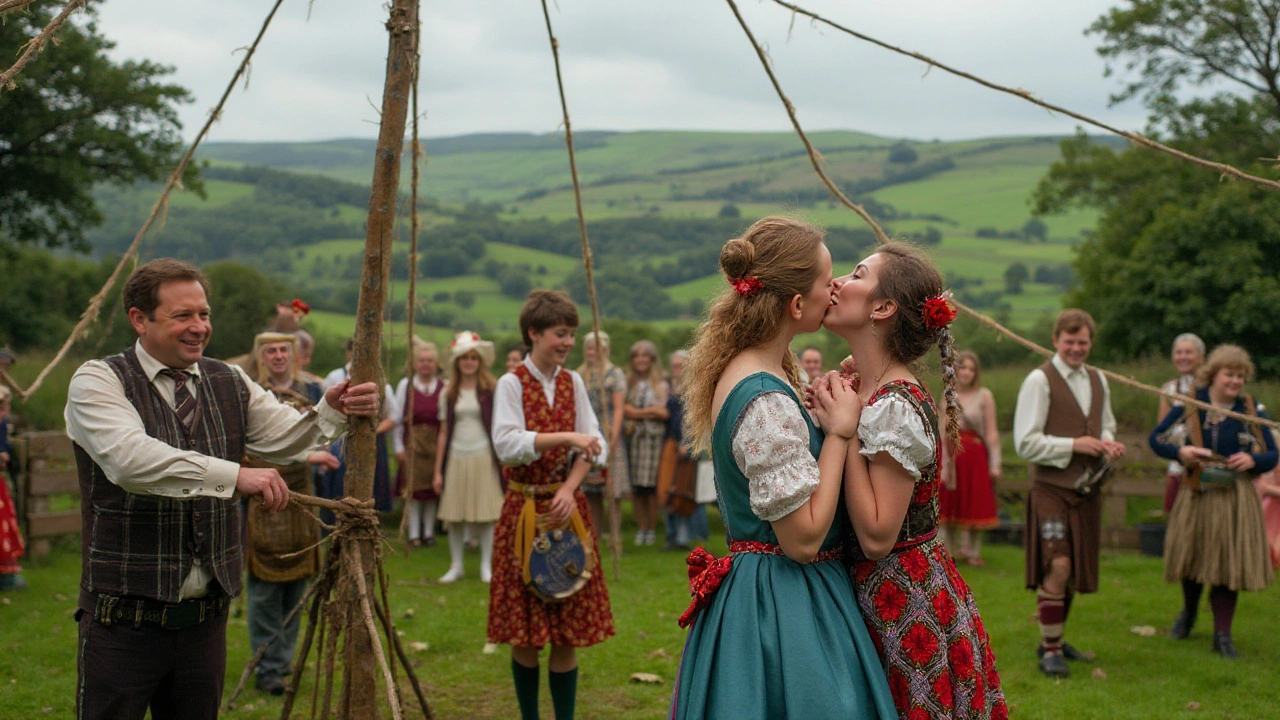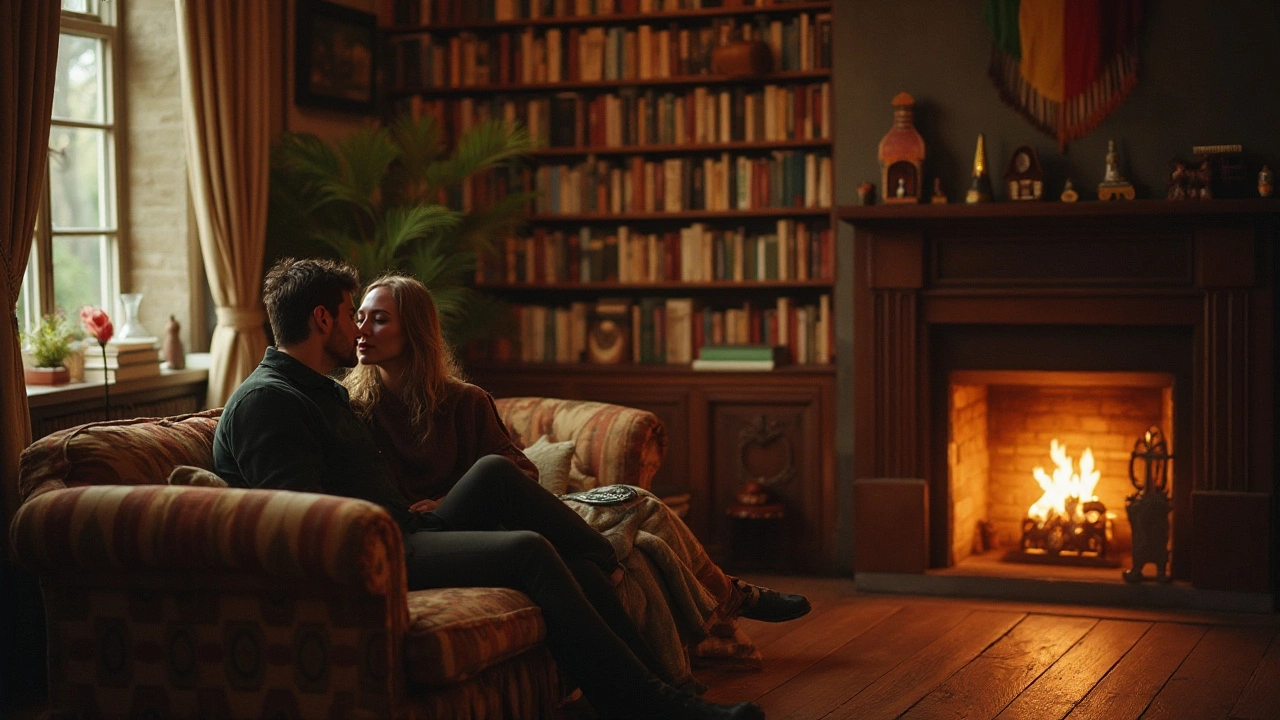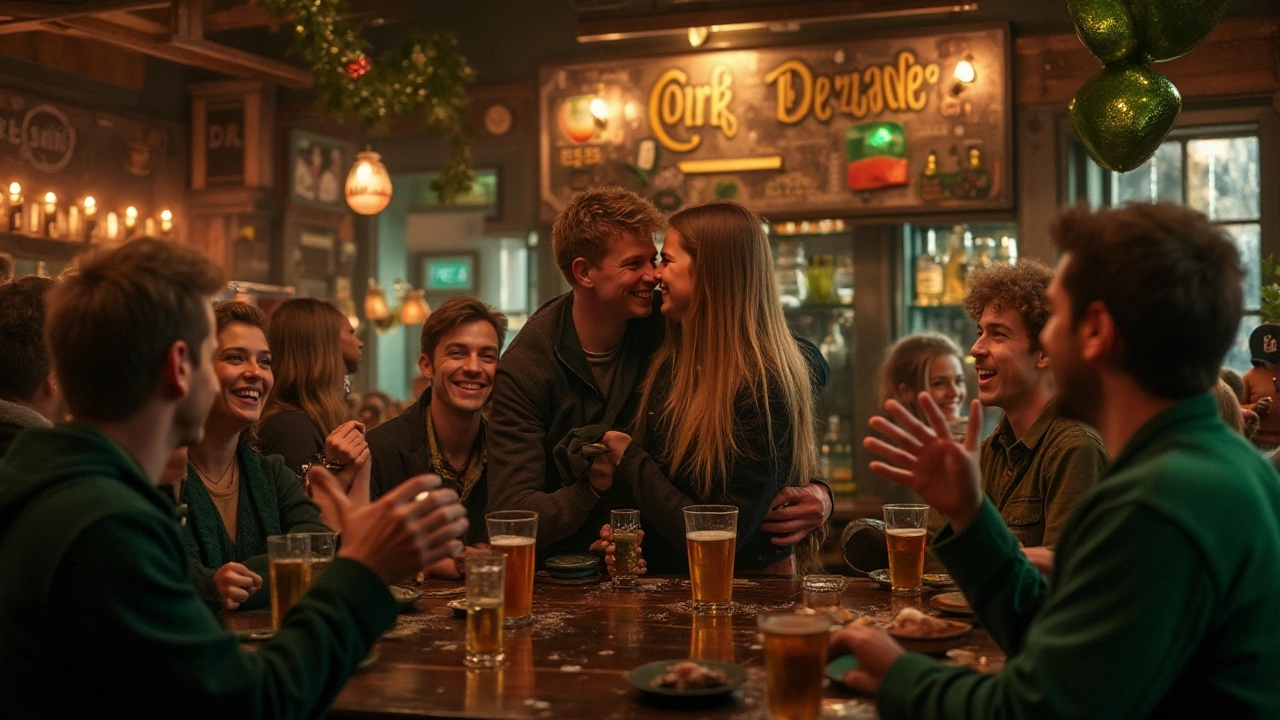In the land of vibrant expressions and lyrical wit, Irish slang emerges as a captivating aspect of communication. With words that seem to dance off the tongue, these expressions carry historical, cultural, and social nuances.
Kissing is no exception to this charm, wrapped up in a playful term or two. Here's an opportunity to explore the vibrant Irish vernacular, particularly those words bestowed upon the intimate act of kissing. We'll delve into how these expressions came to be, their cultural homes, and sprinkle in a few interesting tidbits about their use today.
As you navigate this linguistic journey, you'll find more than just words; you'll glimpse the character and warmth that define Irish culture.
- Understanding Irish Slang
- The Slang for Kissing
- Cultural Roots and Context
- Use of Slang in Daily Life
- Fun Facts and Tips
Understanding Irish Slang
Irish slang is a fascinating cocktail of linguistic history and playful creativity. Its roots are deeply entrenched in Ireland's rich cultural tapestry, having evolved over centuries. A glance at these expressions reveals much about how language can reflect identity. From charming everyday phrases to cheeky colloquialisms, Irish slang encapsulates the humor and warmth inherent in Irish culture.
The Irish language, or Gaeilge, has shaped local slang considerably, intertwining traditional Gaelic words with the English vernacular. This fusion creates a unique linguistic flavor that can be as elusive as it is refreshing for outsiders. Whether you're navigating the bustling streets of Dublin or enjoying a quiet chat in a country pub, these phrases add a layer of intimacy and understanding to social interactions. Understanding Irish slang requires more than just a grasp of vocabulary; it's about appreciating the rhythm and context in which these words are spoken.
Historically, the Irish have faced various social and political challenges, which have also found their way into the language. During the English colonial rule, certain expressions emerged as subtle forms of resistance or cunning ways to communicate without drawing attention. This clever use of language has undoubtedly contributed to the richness of Irish slang today. As you delve into specific terms, you'll notice a certain playfulness that's typical of the Irish spirit, often laced with irony or affectionate teasing.
For the uninitiated, mastering Irish slang might seem daunting, but it's part of the joy of immersing oneself in such a vibrant culture. By engaging with locals and being open to new phrases, one can quickly learn the nuances and have some laughs along the way. An Irish conversation often feels like a dance, with each participant nimble and responsive to the verbal cues given.
"The great thing about Irish slang is that it's as much about how you say something as what you're actually saying," an insight shared by a well-regarded linguist who specializes in Celtic languages.
Slang related to social interactions, such as kissing, offers a window into how certain activities are perceived and enjoyed within Irish society. By learning these terms, one not only enriches their vocabulary but also gains a deeper understanding of the traditions and values that continue to thrive within Ireland. So, if you’re planning a visit or curious about the culture, picking up a few words of Irish slang can be both an enjoyable and enlightening experience.
The Slang for Kissing
**Irish slang** is uniquely enchanting, filled with expressions that breathe life into ordinary actions. In Ireland, the art of kissing has its playful phrases that twist the mundane into the magical. A classic term for kissing is 'shift', delightfully adaptable to both social and romantic contexts. More than just a word, to 'shift someone' transforms an ordinary moment into a memorable one, with tones that echo youthful encounters and spirited nights at the pub. This term is mostly used by the younger crowd, a staple in the lexicon of Irish teenagers.
The origins of 'shift' aren't as clear as its present connotations, though it's widely accepted that it cropped up sometime in the late 20th century. Some suggest it might come from the act of moving or 'shifting' closer to someone, both physically and emotionally. Certainly, there's a mix of excitement and spontaneity attached to it. Often, the term is accompanied with adjectives that set the scene: a 'quick shift' on a breezy coastal walk or a 'slow shift' beneath the comforting dim light of a local pub.
There’s also the delightful variant 'snog', popular in both Ireland and neighboring Britain. A 'snog' carries a slightly more intense connotation, implying a longer, perhaps more passionate, kiss than a 'shift'. Interestingly, though the term 'snog' is shared across regions, the manner and weight added to it can subtly shift between a warm gesture of endearment or a bold public show of affection, depending on who you ask. A cultural exploration of these terms often brings up charming debates about their subtle differences.
"In Ireland, language is as fluid and vivid as the rolling hills, each word a brushstroke painting everyday life with heritage and heart." — John McWhorter, Language Expert
For those seeking to understand more about these expressions, they follow a certain rule of light-heartedness, as much of Irish slang does. It reflects a culture enamored with humor and storytelling. Typical conversations on a night out would reveal these terms, entwined with laughter and camaraderie, as recounting romantic escapades becomes part of the evening lore.
Kissing, as expressed in Irish slang, affectionately mirrors the broader cultural tapestry—a language enriched by emotions, painted with traditions, yet always leaving space for future embellishments. Using these terms is more than about the physical act; it's about acknowledging the nuance and the playful undercurrents of human connection, as seen through the lens of Irish social life.

Cultural Roots and Context
The use of Irish slang for describing common acts such as kissing is deeply intertwined with the island's rich oral tradition. Irish culture has long been renowned for its storytellers, or seanchaí, who weave tales rich with humor and metaphor. This colorful way of speaking spills into everyday life, where even an act as simple as a kiss carries a multitude of slang terms, each hinting at its own history and context. The Irish penchant for humor and double meanings adds layers to language, bending it in delightful ways that both amuse and engage those who encounter it.
In the 19th and early 20th centuries, while Ireland experienced political and social changes, its people held tight to their linguistic identities. These upheavals did not dampen the lighthearted spirit found in its language, a spirit that embraces both past tribulations and the joy of living. It’s this resilient optimism that often finds its way into phrases and slang describing courtship acts like kissing. The very word 'snogging', although more commonly recognized now due to its adoption in wider English slang, carries a mischievous twinge in its Irish usage, a reflection of youthful exuberance.
As noted by historian Seán Collins, "Language in Ireland is more than a tool; it’s an art form crafted over centuries." Often, these expressions trace their roots back to both Gaelic predecessors and English influences, intertwining them into a cultural fabric that's unique to Ireland. Unlike other cultures that might shy away from discussing physical affection openly, the Irish approach these subjects with wit and warmth, revealing an openness in expression that underpins much of its social interactions.
Today, these terms continue to thrive, passed down through generations, infused into modern Irish life. While many traditions have evolved, the heart of Irish storytelling and vivid expression remains strong. These slang words for kissing are not just words; they're cultural heirlooms, tokens passed through generations that invite us to share in a language dancing with life’s playfulness.
Use of Slang in Daily Life
Irish slang is more than just quirky phrases; it embodies a way of living, woven into the fabric of everyday conversations. This linguistic aspect reflects an informality and affability that's prevalent in Irish society. When it comes to words for something as universal as kissing, these expressions capture a unique cultural zest. Among them, the word 'shift' stands out—a playful term often spoken in casual settings or during lively tales shared among friends in a local pub. It’s not just a term but an experience tied to evenings spent in camaraderie, where conversations flow as smoothly as the Guinness being poured.
Such slang does not merely exist for fun but connects deeply to social rituals. The Irish have a tradition of strong communal ties, where a simple act as kissing is expressed with such a word that carries enthusiasm and warmth. Here, language functions as social glue, molding interactions and enriching relationships. The term 'shift,' like other phrases, is a conversational icebreaker, often used to lighten the mood or tease a mate. It’s fascinating how this expression has found its way into the lexicon of young and old alike, continually evolving while retaining its humorous edge.
As we examine the variations in usage, a clear picture emerges of how adaptable and dynamic slang can be. Older generations reminisce about simpler times when these words were part of courtship dances, and the younger crowd might employ it as a cheeky reference in a bustling nightclub. Such diversity in use emphasizes the richness of Irish culture, where heritage and modernity dance in harmony. Irish slang thus acts as a bridge across generations, a testimony to shared cultural identity that thrives on little things, much like the hearty laughter heard across the Irish countryside.
"Language, at its best, reveals the soul of a people, and in Ireland, it sings softly yet spiritedly through their everyday banter." — Fiona Shaw
Moreover, the spontaneous nature of Irish conversations often sees slang being adopted, adapted, and sometimes invented on the spot. It’s a living, breathing part of society, growing as organically as the green landscapes of Ireland itself. Whether you're a tourist trying to fit in or a local engaging in a friendly debate, this playful vernacular is a gateway into the heart of Irish life. So next time you hear someone cheekily ask if you’ve 'shifted' anyone lately, just remember it’s all part of the cultural tapestry that makes the Emerald Isle shimmer with charm and warmth.

Fun Facts and Tips
Diving into the quirky world of Irish slang for kissing unveils a wealth of entertaining tidbits and cultural insights. One of the most delightful terms you might stumble across is “shift.” This word, deeply embedded in Irish youth culture, isn't just about the kiss itself but often the initial phases of courtship and flirtation. You might hear someone say they "got the shift," effectively sharing that they managed a romantic moment, often in bustling nightspots or social gatherings.
The fascinating part of this slang is its ability to paint a vivid picture of social dynamics. Back in the day, before digital interactions took the front seat, much of Irish courting was done in local dance halls. Picture lively jig tunes and shared glances across the room—these settings were ripe for a chance to "shift." This term, though light-hearted, carries on the tradition of social interactivity, emphasizing the personal, face-to-face connection which is often lost in our tech-centric world.
Unexpected Popularity
"Irish slang fills your mouth and dances over the row of your teeth in a way that formally structured languages simply can’t." – James Foley, Linguistic HistorianThe allure of such colloquial language extends beyond Ireland's emerald borders. Irish slang has found its way into numerous global contexts, mainly due to migration and the widespread appeal of Irish culture. For instance, many British films and television shows have adopted "shift," which adds a touch of authenticity and friendliness to their characters. As a result, understanding and using these terms can often serve as a handy icebreaker or conversation starter in cosmopolitan settings.
Moreover, there's an element of humor attached to Irish slang for kissing that aligns perfectly with the Irish spirit. This humor lowers guards and fosters amicability among peers. It’s entertaining to note that asking someone for a "shift" in certain settings might lead to comical confusion or misinterpretations, especially among those unfamiliar with its meaning. Such misunderstandings have contributed to cultural anecdotes told humorously among friends during gatherings, blending laughter with learning.
Tips on Using Irish Slang
If you’re interested in incorporating Irish slang into your vernacular, there are simple, yet practical tips to ensure you do it smoothly. First, tune into the context; slang thrives in casual settings among friends or peers rather than formal scenarios. Start by dropping a few casual lines into a chat with friends familiar with the slang—perhaps the next time you're sharing a story from a memorable night out. Notice how these words can enrich conversation dynamics and add a touch of cultural wit.
Another tip is to engage with Irish media. Films, series, and even podcasts often feature everyday Irish conversations, allowing you to grasp pronunciation nuances and appropriate contexts better. Remember, there's no rush. Slang localization is an organic process, more about perception than perfection. And if you ever find yourself in the heart of Ireland, embrace the lilt and laughter that naturally accompany it. Engaging with the locals might just earn you a fond "shift" or two, not just in the literal sense but perhaps a delightful shift in perspective as well.

